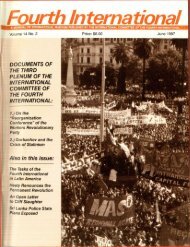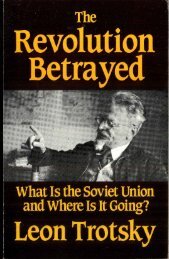Workers League - Behind the US invasion of Somalia - Mehring Books
Workers League - Behind the US invasion of Somalia - Mehring Books
Workers League - Behind the US invasion of Somalia - Mehring Books
You also want an ePaper? Increase the reach of your titles
YUMPU automatically turns print PDFs into web optimized ePapers that Google loves.
government placed its stamp not least upon <strong>the</strong> way in which it went<br />
about attempting to achieve <strong>the</strong> goal it had set for itself, that is, <strong>the</strong><br />
political unification <strong>of</strong> <strong>the</strong> Somali people throughout <strong>the</strong> region.<br />
The government first appealed to <strong>the</strong> rising national leaders in<br />
o<strong>the</strong>r African colonies for assistance in settling <strong>the</strong> issue. In 1962, on<br />
<strong>the</strong> eve <strong>of</strong> Kenyan independence, for instance, <strong>the</strong> Somali government<br />
invited Jomo Kenyatta, <strong>the</strong> head <strong>of</strong> <strong>the</strong> leading Kenyan African<br />
nationalist party, to Mogadishu for informal talks. 17<br />
Kenyatta had<br />
until recently been imprisoned for his opposition to British rule in<br />
Kenya, but he firmly opposed <strong>the</strong> unification <strong>of</strong> <strong>the</strong> Somali people in<br />
<strong>the</strong> Nor<strong>the</strong>rn Frontier District with <strong>Somalia</strong>. Kenyatta made it clear<br />
to <strong>the</strong> Somali regime that he regarded <strong>the</strong> NFD an inalienable part<br />
<strong>of</strong> Kenya.<br />
This was to be <strong>the</strong> attitude adopted by <strong>the</strong> vast majority <strong>of</strong> <strong>the</strong><br />
African nationalists, who proved to be staunch defenders <strong>of</strong> <strong>the</strong><br />
colonial boundaries. Britain, too, proclaimed that <strong>the</strong> NFD would<br />
remain part <strong>of</strong> Kenya after independence.<br />
This failure <strong>of</strong> <strong>the</strong> government to secure political support for<br />
Somali unification had a pr<strong>of</strong>ound impact on subsequent events. In<br />
1963, <strong>Somalia</strong> broke relations with Kenya and Britain, while tension<br />
began to mount with Ethiopia as well over its control <strong>of</strong> <strong>the</strong> disputed<br />
territory <strong>of</strong> <strong>the</strong> Ogaden. Addis Ababa was being supplied with<br />
military aid by <strong>the</strong> <strong>US</strong>, so <strong>Somalia</strong> sought concomitant support<br />
wherever it could find it. In November 1963, <strong>Somalia</strong> accepted<br />
military aid worth nearly $30 million from <strong>the</strong> Soviet Union, having<br />
rejected a smaller <strong>of</strong>fer <strong>of</strong> Western aid. The following year <strong>the</strong><br />
dispute with Ethiopia led to fighting for <strong>the</strong> first time, and <strong>Somalia</strong><br />
signed fur<strong>the</strong>r agreements with <strong>the</strong> Soviet Union.<br />
In June 1967, Ali Shermarke became president <strong>of</strong> <strong>Somalia</strong> and<br />
Mohammed Hadji Ibrahim Egal, prime minister. Egal, was <strong>the</strong> leader<br />
<strong>of</strong> <strong>the</strong> Somali National Movement, which had been <strong>the</strong> main Somali<br />
party in British Somaliland. The following year, diplomatic relations<br />
with Kenya and Britain were resumed, but relations with Ethiopia<br />
deteriorated fur<strong>the</strong>r with <strong>the</strong> growth <strong>of</strong> <strong>the</strong> Western Somali Liberation<br />
Front, which was contesting Ethiopia's control <strong>of</strong> <strong>the</strong> Ogaden.<br />
In October 1969, Shermarke was assassinated. One week later, <strong>the</strong><br />
army seized control in a coup, and Mohammed Siad Barre, <strong>the</strong> head<br />
<strong>of</strong> <strong>the</strong> armed forces, proclaimed <strong>the</strong> Somali Democratic Republic.<br />
Davidson describes <strong>the</strong> events leading up to <strong>the</strong> coup in <strong>the</strong>se<br />
terms: "Presented as a multiparty system with <strong>the</strong> highest credentials,<br />
<strong>the</strong> constitution had led directly and indeed logically to a one-party





